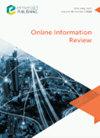值得分享的故事——为什么人们要在网上传播新闻?
IF 3.1
3区 管理学
Q2 COMPUTER SCIENCE, INFORMATION SYSTEMS
引用次数: 0
摘要
网络错误信息的阴险扩散代表了一个重大的社会问题。尽管对这一话题进行了大量研究,但目前尚不清楚是什么决定了虚假新闻的分享。本文在操纵恐怖主义新闻的新实验环境中比较检验了虚假和准确的新闻分享。设计/方法/方法作者遵循新闻分享的使用和满足框架的扩展版本,辅以假新闻反驳研究中常用的变量。结果Logistic回归和分类树显示,对话题的担忧、媒介素养、信息寻求和保守性是在线新闻分享意愿的重要预测因素。一般分析思维、新闻怀疑主义、阴谋思想、使用和满足动机或打发时间的应对策略没有发现显著的关联。当前的研究结果拓宽和扩展了研究错误信息的信念和分享的文献,强调了媒体素养在保护公众免受假新闻传播方面的作用。据作者所知,这是第一个在单一实验框架内整合广泛的理论和经验驱动的假新闻分享预测因素的研究。同行评议本文的同行评议历史可在:https://publons.com/publon/10.1108/OIR-12-2022-0693本文章由计算机程序翻译,如有差异,请以英文原文为准。
Stories worth sharing – why do people spread news online?
Purpose The insidious proliferation of online misinformation represents a significant societal problem. With a wealth of research dedicated to the topic, it is still unclear what determines fake news sharing. This paper comparatively examines fake and accurate news sharing in a novel experimental setting that manipulates news about terrorism. Design/methodology/approach The authors follow an extended version of the uses-and-gratification framework for news sharing, complemented by variables commonly employed in fake news rebuttal studies. Findings Logistic regression and classification trees revealed worry about the topic, media literacy, information-seeking and conservatism as significant predictors of willingness to share news online. No significant association was found for general analytical thinking, journalism skepticism, conspiracy ideation, uses-and-gratification motives or pass-time coping strategies. Practical implications The current results broaden and expand the literature examining beliefs in and sharing of misinformation, highlighting the role of media literacy in protecting the public against the spread of fake news. Originality/value This is, to the authors’ knowledge, the first study to integrate a breadth of theoretically and empirically driven predictors of fake news sharing within a single experimental framework. Peer review The peer review history for this article is available at: https://publons.com/publon/10.1108/OIR-12-2022-0693
求助全文
通过发布文献求助,成功后即可免费获取论文全文。
去求助
来源期刊

Online Information Review
工程技术-计算机:信息系统
CiteScore
6.90
自引率
16.10%
发文量
67
审稿时长
6 months
期刊介绍:
The journal provides a multi-disciplinary forum for scholars from a range of fields, including information studies/iSchools, data studies, internet studies, media and communication studies and information systems.
Publishes research on the social, political and ethical aspects of emergent digital information practices and platforms, and welcomes submissions that draw upon critical and socio-technical perspectives in order to address these developments.
Welcomes empirical, conceptual and methodological contributions on any topics relevant to the broad field of digital information and communication, however we are particularly interested in receiving submissions that address emerging issues around the below topics.
Coverage includes (but is not limited to):
•Online communities, social networking and social media, including online political communication; crowdsourcing; positive computing and wellbeing.
•The social drivers and implications of emerging data practices, including open data; big data; data journeys and flows; and research data management.
•Digital transformations including organisations’ use of information technologies (e.g. Internet of Things and digitisation of user experience) to improve economic and social welfare, health and wellbeing, and protect the environment.
•Developments in digital scholarship and the production and use of scholarly content.
•Online and digital research methods, including their ethical aspects.
 求助内容:
求助内容: 应助结果提醒方式:
应助结果提醒方式:


